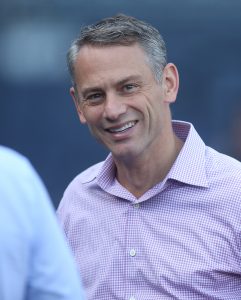The Cubs formally introduced longtime general manager Jed Hoyer as their president of baseball operations via press conference on Monday, not long after announcing that he’d signed a five-year deal through the 2025 season. (Fans can re-watch the entire press conference on Twitter.) Hoyer’s promotion maintained some continuity among the club’s decision-makers, but it also created a hole in the front office infrastructure, as the team did not promote a replacement GM to take on his former duties.
While Hoyer’s very promotion speaks to trusting the in-house group, however, he revealed that his expectation is to hire a general manager from outside the organization rather than to promote from within. The 46-year-old spoke of valuing new ideas, new input and new ways of thinking to help keep things fresh. The timing of any such hire, however, remains unclear. Hoyer acknowledged that there’d likely be an announcement in the coming days of some in-house promotions, but he merely said he planned to conduct a search for his new GM and wouldn’t further delve into specifics as to when the process would commence or draw to a close.
Unsurprisingly, Hoyer was asked frequently about the status of the team’s arbitration-eligible players and the payroll flexibility (or lack thereof) that he expects to have as he looks to put together next year’s roster. Asked specifically about the possibility of non-tendering or trading Kris Bryant, Hoyer declined to answer, instead speaking more broadly about the service-time-driven realities that he and the rest of the front office will have to face this winter.
While the newly minted president of baseball ops didn’t mention specific names, the obvious inference is that each of Bryant, Javier Baez and Kyle Schwarber possesses five-plus years of service time, thus placing them on track to become free agents next winter. Bryant ($18.6MM), Baez ($10.7MM and Schwarber ($7.9MM) all possess rather sizable projected arbitration salaries — a particularly tricky scenario for Hoyer & Co. to navigate given Bryant’s poor showing at the plate in 2020. There’s already been plenty of rumors surrounding a possible trade of Bryant — as has has been the case for the better part of two years — and the fact that Hoyer was even asked about the idea of non-tendering the former NL MVP speaks to the difficulty of the team’s looming decision.
Of course, for as much talk as there’s been of trading Bryant, there’s been as much or more talk about extending Baez. Any efforts on that front — or with regard to Bryant, Schwarber, Willson Contreras or any other Cubs player — seem to be on hold for the time being. Hoyer plainly acknowledge that there are no ongoing extension talks at this time, although he did add that there are “players on this roster that we’d love to have here for a long time.”
All of the uncertainty surrounding not only the Cubs arb-eligible regulars but even some of the team’s pitching — Yu Darvish and Kyle Hendricks have both been speculated upon as trade candidates — will lead onlookers to wonder about the possibility of a rebuild, but owner Tom Ricketts suggested otherwise. “I don’t think anyone is tearing anything down,” he said.
Hoyer, however, conceded that given the service time of some Cubs stalwarts, he might have one eye on the future a bit more than in other offseasons. He also indicated that he believes the Cubs should be able to field a playoff-caliber roster on a yearly basis, citing a goal of winning the division in 2021. Clearly, the upcoming offseason will be a bit of a balancing act, although that’s been apparent for some time now.
Just as predecessor Theo Epstein did prior to stepping down, Hoyer suggested that “the offense will look different next year.” The paths that the Cubs can take to realize that change are of course countless, and there are elements that are out of their control that still need to be factored into the equation. Notably, the Cubs and other National League teams are still uncertain as to whether there will be a designated hitter in the National League for the 2021 season. To this point, Hoyer said, it’s not clear when a firm resolution on that potential change will be in place.
As for just what sort of resources he’ll have at his disposal while striving to meet that goal in 2021, it’s not yet clear. Ricketts acknowledged that uncertainty regarding what levels of fan attendance would be permissible in 2021 have clouded the team’s budgetary outlook. Wrigley Field was recently granted National Historic Landmark status, as covered by Fran Spielman of the Chicago Sun-Times, but Ricketts indicated that the associated federal tax credits won’t have an impact on player payroll.
It’s worth highlighting, too, that the Cubs have work to beyond the roster and the front office. Will Venable’s hiring as the Red Sox’ new bench coach leaves a gap on the Chicago coaching staff. Hoyer said he’ll begin a search in the near future to fill Venable’s role as a base coach and outfield instructor. The organization’s decision to part ways with assistant hitting coach Terrmel Sledge left another vacancy, but they’ll stay in house to fill that void. Former big league infielder Chris Valaika, who has spent the past couple seasons as the Cubs’ minor league hitting coordinator, will join the Major League staff and take over Sledge’s prior role.
